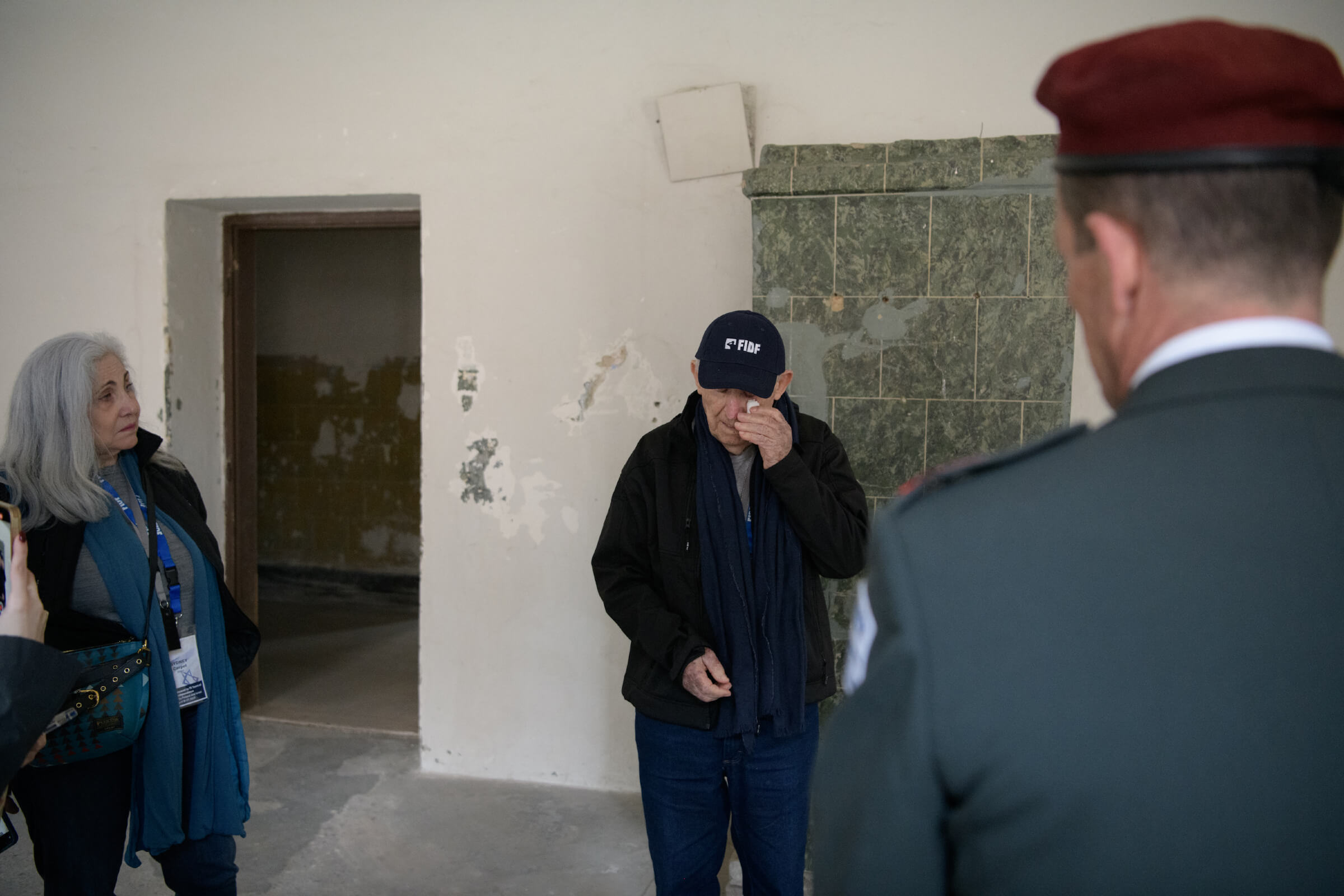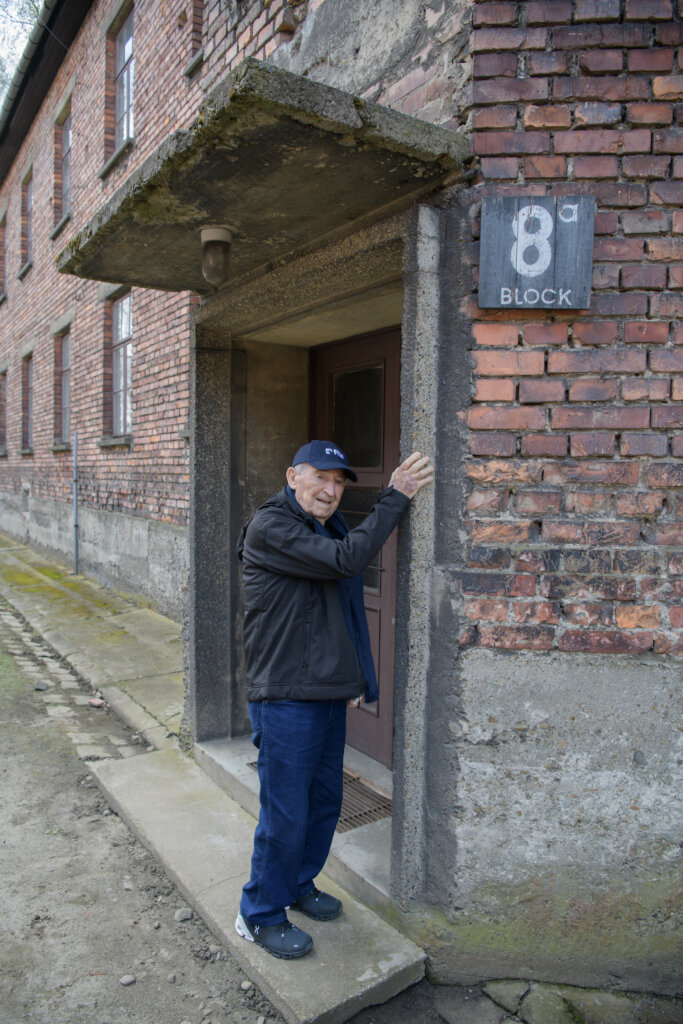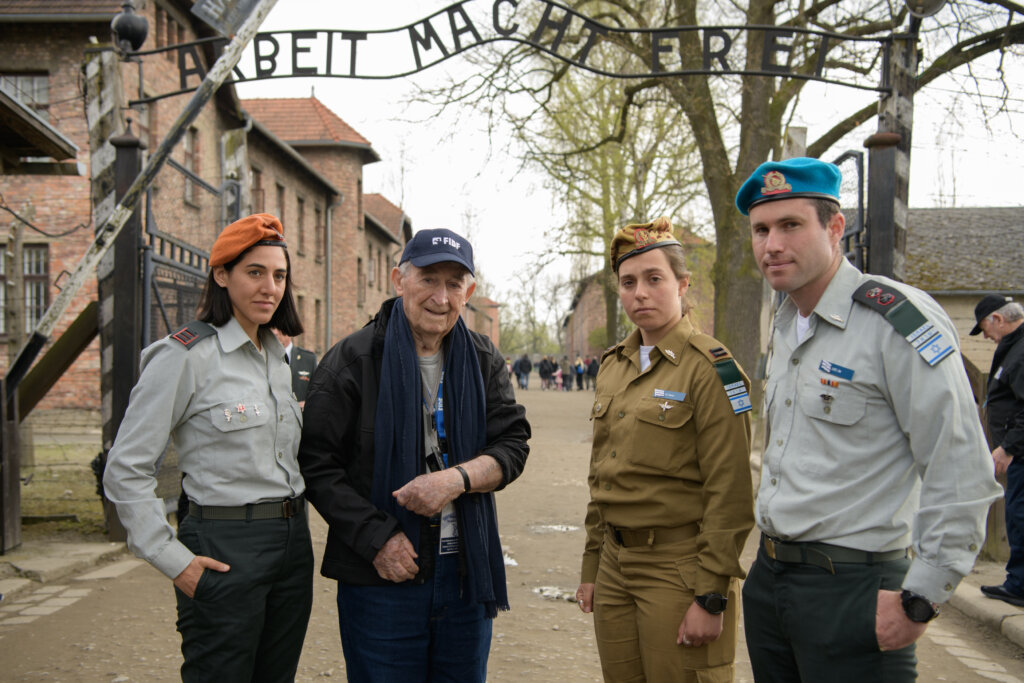‘I was sick to my heart’: Holocaust survivor, 94, returns to the Auschwitz cell block where he spent years of his childhood
No survivor had ever before returned to Cell Block 8

Graphic by Angelie Zaslavsky

David Schaecter was 11 when the Nazis locked him in Cell Block 8 in the Auschwitz-Birkenau concentration and extermination camp. They starved and tortured him there for nearly three years. On Monday, about eight decades years after his imprisonment, the now 94-year-old returned to Block 8.
He is the first Holocaust survivor, and first member of the public since World War II, to enter the space, which is in a closed part of Poland’s government-funded Auschwitz Museum.
“I was sick to my heart, I was trembling, I was remembering,” Schaecter told the Forward in a phone interview from Jerusalem on Wednesday, two days after his visit to Auschwitz. “For me to be back there in this gehinnom [Hebrew for purgatory] was not an easy thing,” and he recalled the many times he had been beaten there.
Schaecter, who has returned to Auschwitz about 20 times as part of the March of the Living, said he had been turned away each time he sought entrance to the cell block in the past.
One of the founders of the march, as well as of the Holocaust Memorial in Miami Beach, Florida, Schaecter came to Poland this year with his wife, Sydney Carpel, as part of a “Holocaust to Independence” mission of 125 people organized by Friends of the Israel Defense Forces. Before entering Block 8, he told the group what happened to him during the Holocaust and asked them to “become witnesses” in his stead.
“I want you to speak to every child you meet about your experience here,” he said. “I’m quite certain I am not going to be back here anymore.”
‘He couldn’t breathe’
When they first entered the cell block, Carpel said they walked upstairs to what looked like a waiting room, and then to the barracks where there once had been beds — but it was empty. They entered another room. “David said this was the one he was in,” she said. “He told me he imagined it with all of the furniture there.”
His reaction was physical.
“He said he felt like he was going to faint,” Carpel continued. “He couldn’t breathe and was in physical pain. He told me he got bad cramps in his stomach and chest and felt like he was having a heart attack. We were inside at the most for 10 minutes.”
Only four people were permitted by the museum to accompany Schaecter and his wife into the cell block. One of them was Steve Weil, national director and CEO of the FIDF, who said his office had contacted the museum before the trip and told them they were bringing a survivor of Cell Block 8 who wished to visit it. He said they had to sign an agreement that the museum would not be held liable in the event someone fell or hurt themselves during the visit.
“As long as I live, I will never forget that experience — watching that transformation as he re-experienced his time in Auschwitz,” Weil said. “He was in control of his emotions when he told his life story to the whole group beforehand. But when he walked into that building you could see he was incredibly overcome with emotion.”

Weil said Schaecter described the cramped bunks and how getting up in the middle of the night to go to the bathroom meant a beating from the Nazi guards. He said they were worse than the SS, the elite Nazi guards.
“During the day his job was to clean out the trains and that the guards would shout, `Shnel, shnel — faster, faster — and beat them multiple times,” Weil said. “He was talking to us in 2023, but he was in 1941 and 1942 in Auschwitz.”
Weil said Schaecter also recalled a rabbi in the barracks who looked after and comforted him, “and he also described how they murdered the rabbi in a barbaric way.” He said Schaecter also talked about his older brother, who was with him in the barracks and who died toward the end of the war.
“When he spoke about them, his eyes welled up with tears,” Weil said. “This is a man of incredible dignity.”
Schaecter, who was transported to Buchenwald after two years and 10 months in Auschwitz, said that while at the death camp someone asked if he ever considered forgiving his captors.
“I said, `Listen, I can’t forget. How can I forgive?’”
And he said he found the entire experience — including walking through the forest and visiting the crematoria – very difficult.
“I was pissed at myself that I agreed to come. I am not as strong as I thought I’d be,” he said. “I don’t know how in God’s name I came out of the Holocaust alive. What gave me strength was having IDF commanders by my side.”
Stewart Ain’s interview with David Schaecter for “Jewish Life,” a show on Long Island’s Cablevision Channel 20, can be seen starting Monday May 1 at Jewishlifeshow.com















